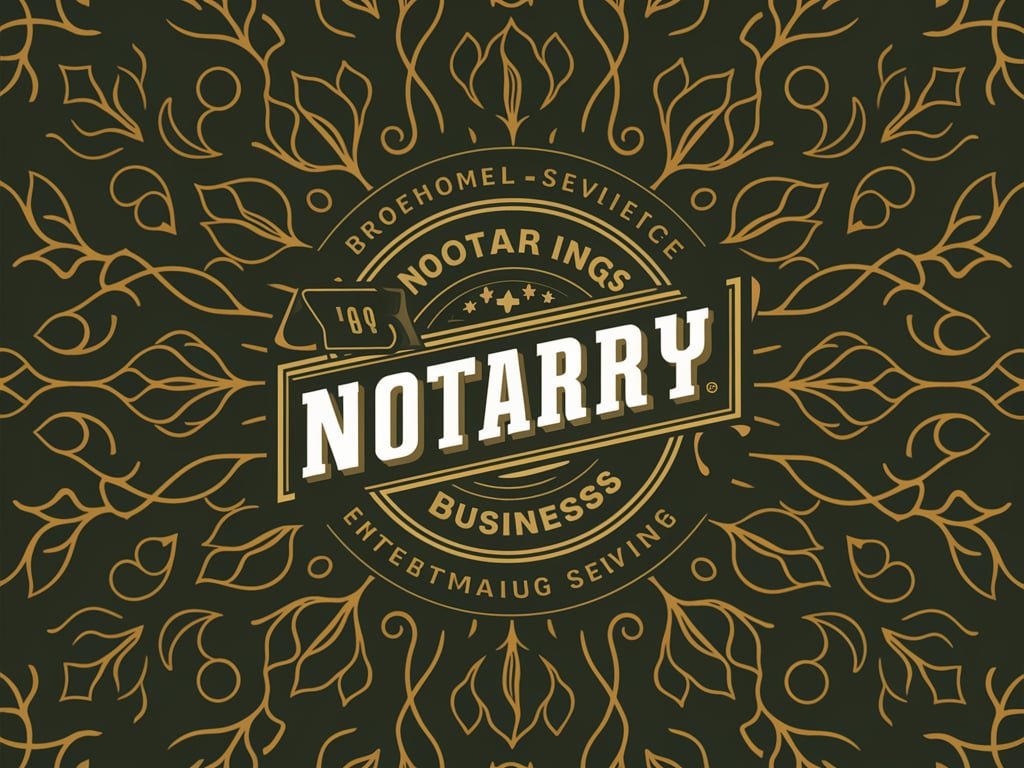In the notary profession, first impressions are crucial. A well-designed notary business card can be a powerful tool to create a lasting impact on potential clients. It serves as a professional introduction, providing essential information and showcasing your brand identity. Whether you’re a seasoned notary public or just starting in the field, understanding the importance of a thoughtfully designed business card can significantly enhance your business. In this article, we will explore the key elements of notary business cards, the benefits of having one, and tips for designing a card that stands out.
1. The Importance of Notary Business Cards
First Impressions Matter
A business card is often the first physical representation of your notary service that a potential client encounters. It conveys professionalism, trustworthiness, and attention to detail—qualities that are essential in the notary field. A well-designed card can leave a lasting impression, making clients more likely to remember and contact you for future services.
Easy Access to Information
A business card provides a convenient way for clients to access your contact information. It typically includes your name, title (e.g., Notary Public), phone number, email address, and office address. This information should be easily readable and presented in a clean, organized manner.
Networking and Referrals
In the notary profession, networking is key to building a client base. Business cards are a handy tool for networking events, conferences, and casual encounters. They can also serve as a referral tool, allowing satisfied clients to pass on your contact information to others who may need notary services.
2. Essential Elements of Notary Business Cards
Key Information
Every notary business card should include the following key pieces of information:
- Full Name: Clearly display your full name as it appears on your notary commission.
- Title: Indicate your title, such as “Notary Public” or “Certified Notary Signing Agent.”
- Contact Information: Include a phone number and email address. If you have a physical office, include the address as well.
- License or Commission Number: In some regions, it may be required or beneficial to include your notary commission number.
- Business Logo: If you have a business logo, include it on your card to establish brand recognition.
Design and Layout
The design and layout of your business card are crucial in making a strong first impression. Here are some design tips:
- Simplicity: Keep the design clean and uncluttered. Avoid overcrowding the card with too much information or overly elaborate graphics.
- Readable Fonts: Use professional, easy-to-read fonts. Avoid using too many different fonts, which can make the card look chaotic.
- Color Scheme: Choose a color scheme that reflects your brand. Neutral colors like blue, black, and white are often associated with professionalism and trustworthiness.
- Logo Placement: Place your logo in a prominent position, typically at the top or bottom of the card.
- High-Quality Materials: Use high-quality paper or card stock. A thicker card feels more substantial and conveys a sense of quality.
3. Benefits of Well-Designed Notary Business Cards
Professionalism and Credibility
A professionally designed business card enhances your credibility as a notary public. It signals to clients that you are serious about your profession and committed to providing quality service.
Convenience for Clients
Clients appreciate having easy access to your contact information. A business card fits neatly into a wallet or cardholder, making it convenient for clients to keep your information handy.
Marketing and Branding
Your business card is a powerful marketing tool. It helps to reinforce your brand identity and can set you apart from competitors. A unique design can make your card memorable, encouraging clients to choose your services over others.
Enhanced Networking Opportunities
Having business cards readily available allows you to capitalize on networking opportunities. Whether you’re at a professional event or a social gathering, being able to hand out a business card can lead to new business connections.
Table: Key Elements of Notary Business Cards
| Element | Description | Importance |
| Full Name | Your full name as it appears on your notary commission. | Identification and professionalism. |
| Title | “Notary Public” or “Certified Notary Signing Agent.” | Clarifies your professional role. |
| Contact Information | Phone number, email address, and office address if applicable. | Facilitates client communication. |
| License/Commission Number | Your notary commission number. | Builds trust and compliance. |
| Business Logo | Your business logo, if applicable. | Branding and recognition. |
| Design/Layout | Clean, professional design with readable fonts. | Enhances first impressions. |
| Color Scheme | Consistent with your brand identity. | Professional appearance. |
| High-Quality Materials | Thick, high-quality card stock. | Conveys quality and care. |
4. Tips for Designing Effective Notary Business Cards
Keep It Simple
Simplicity is key in business card design. Avoid clutter and focus on the essentials. A clean, simple design ensures that your card is easy to read and professional-looking.
Use Professional Fonts
Choose fonts that are easy to read and look professional. Sans-serif fonts are often a good choice for a clean, modern look. Ensure that the font size is large enough to be readable without straining the eyes.
Choose a Consistent Color Scheme
Select a color scheme that aligns with your brand identity. Neutral colors like blue, black, and gray are often associated with professionalism and trust. However, don’t be afraid to use a pop of color if it aligns with your brand’s personality.
Include a Logo
If you have a business logo, include it on your card. The logo should be clear and positioned in a prominent place. It helps to establish brand recognition and makes your card more memorable.
Invest in Quality Materials
The quality of the card stock can make a significant difference in the overall impression your business card makes. Choose a high-quality, thick card stock that feels substantial. This not only looks better but also lasts longer, making it more likely that clients will keep your card.
Consider Special Finishes
Special finishes, such as embossing, foil stamping, or matte coating, can add a touch of elegance to your business cards. These finishes can make your card stand out and convey a sense of quality and professionalism.
Double-Check Information
Before printing, double-check all the information on your card. Ensure that your name, contact details, and any other information are correct and up-to-date. Mistakes on business cards can be costly and may damage your professional image.
5. Conclusion: Making the Most of Your Notary Business Cards
Notary business cards are more than just a means of providing contact information; they are an essential tool for building your professional image and brand. By investing in well-designed business cards, you can leave a lasting impression on clients and potential business partners.
From selecting the right design elements to choosing high-quality materials, every detail matters in creating an effective business card. Remember, your business card is often the first impression a client will have of your notary service. Make it count by ensuring it reflects the professionalism, credibility, and quality of your work.
In conclusion, take the time to design a notary business card that accurately represents your brand and services. Use the tips and guidelines provided in this article to create a card that not only looks great but also serves as an effective marketing tool. With the right design, your business card can be a powerful asset in growing your notary business and establishing a strong professional presence in the market.




